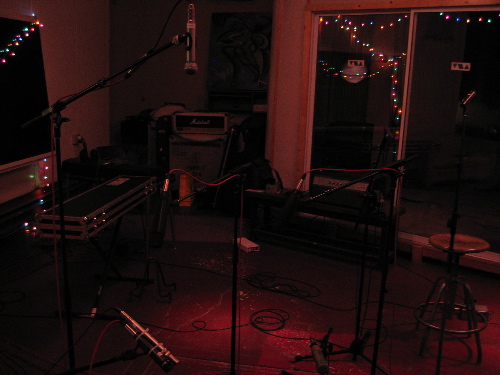May 18, 2004
CROSSFADE

4:45 PM, Tuesday evening:
I am on the Q train, re-reading Geoffrey O'Brien's “Sonata For Jukebox.” Precisely as I begin reading the passage reproduced below, three musicians step onto the train at Union Square. A young man is carrying an upright bass (there's a big rubber stop on the bottom peg, like something you'd see on the end of an orthopedic cane). Two middle-aged men follow, one carrying a six-string nylon acoustic guitar, the other an accordion. The guitar player is wearing an electric blue shirt, a diamond loop in each earlobe and white cowboy boots. His black hair is restrained by a black cord, creating a gentle pony-mullet. The accordion player is wearing a white cowboy shirt with black piping. The subway starts up and the trio waits for a few seconds before starting a loping, Mexican version of the blues. (I should be able to ID the form, but I can't.) The words include something about "el rey": the rest is lost below the rumble of the train and my high school Spanish.
This excerpt is from pages 57 and 58 of Sonata For Jukebox. O'Brien's grandfather, Bob Owens, was the leader of the Rainbow Club Orchestra, "a bright episode in the entertainment world of eastern Pennsylviania during the early '30s":
"The Rainbow Club Orchestra was a ten-piece dance band made up largely of untrained musicians scuffling to survive in a region suffering from the worst effects of the Depression. Eking out a living as mine workers or door-to-door salesmen or factory hands, barely finding time to rehearse, lugging instruments, cumbersome music stands, the metal trumpet hats for that "burnished brass sound," and stacks of arrangements from one small town to another along narrow and dilapidated mountain roads, they were lucky if they could make five bucks a many for many hours of continuous playing. They managed to keep it together for five or six years. They never recorded or even had an offer. Their arranger eventually committed suicide. They disappeared into that limbo where unrecorded dance bands play without interruption for the ghosts of the unremembered.
Behind the recorded music from that era that I heard as a child, their absent music hovered. Ignorant of nearly everything about music except for the fact that recordings existed, I was unduly disturbed by the idea of music drifting off into the ether without leaving a trace behind. Did that mean it was for nothing?"
Posted by Sasha at May 18, 2004 05:12 PM | TrackBack